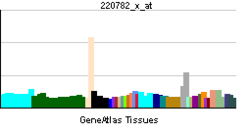KLK12
| Kallikrein-related peptidase 12 | |||||||||||||
|---|---|---|---|---|---|---|---|---|---|---|---|---|---|
| Identifiers | |||||||||||||
| Symbols | KLK12 ; KLK-L5; KLKL5 | ||||||||||||
| External IDs | OMIM: 605539 MGI: 1916761 HomoloGene: 44690 ChEMBL: 4943 GeneCards: KLK12 Gene | ||||||||||||
| |||||||||||||
| RNA expression pattern | |||||||||||||
 | |||||||||||||
| More reference expression data | |||||||||||||
| Orthologs | |||||||||||||
| Species | Human | Mouse | |||||||||||
| Entrez | 43849 | 69511 | |||||||||||
| Ensembl | ENSG00000186474 | ENSMUSG00000044430 | |||||||||||
| UniProt | Q9UKR0 | B2RVZ0 | |||||||||||
| RefSeq (mRNA) | NM_019598 | NM_027097 | |||||||||||
| RefSeq (protein) | NP_062544 | NP_081373 | |||||||||||
| Location (UCSC) | Chr 19: 51.53 – 51.54 Mb | Chr 7: 43.77 – 43.77 Mb | |||||||||||
| PubMed search | |||||||||||||
Kallikrein-12 is a protein that in humans is encoded by the KLK12 gene.[1][2][3]
Kallikreins are a subgroup of serine proteases having diverse physiological functions. Growing evidence suggests that many kallikreins are implicated in carcinogenesis and some have potential as novel cancer and other disease biomarkers. This gene is one of the fifteen kallikrein subfamily members located in a cluster on chromosome 19. Alternate splicing of this gene results in three transcript variants encoding different isoforms.[3]
References
- ↑ Lundwall A, Band V, Blaber M, Clements JA, Courty Y, Diamandis EP, Fritz H, Lilja H, Malm J, Maltais LJ, Olsson AY, Petraki C, Scorilas A, Sotiropoulou G, Stenman UH, Stephan C, Talieri M, Yousef GM (Jun 2006). "A comprehensive nomenclature for serine proteases with homology to tissue kallikreins". Biol Chem 387 (6): 637–41. doi:10.1515/BC.2006.082. PMID 16800724.
- ↑ Diamandis, Eleftherios P.; Deperthes, David; Lundwall, Åke (Jun 2006). "Proceedings of the 1st International Symposium on Kallikreins, Lausanne, Switzerland, September 1-3 , 2005". Biol Chem 387 (6): 635–824. doi:10.1515/BC.2006.081. PMID 16800723.
- ↑ 3.0 3.1 "Entrez Gene: KLK12 kallikrein-related peptidase 12".
Further reading
- Diamandis EP, Yousef GM, Luo LY et al. (2001). "The new human kallikrein gene family: implications in carcinogenesis.". Trends Endocrinol. Metab. 11 (2): 54–60. doi:10.1016/S1043-2760(99)00225-8. PMID 10675891.
- Yousef GM, Luo LY, Diamandis EP (2000). "Identification of novel human kallikrein-like genes on chromosome 19q13.3-q13.4.". Anticancer Res. 19 (4B): 2843–52. PMID 10652563.
- Harvey TJ, Hooper JD, Myers SA et al. (2001). "Tissue-specific expression patterns and fine mapping of the human kallikrein (KLK) locus on proximal 19q13.4.". J. Biol. Chem. 275 (48): 37397–406. doi:10.1074/jbc.M004525200. PMID 10969073.
- Yousef GM, Chang A, Scorilas A, Diamandis EP (2000). "Genomic organization of the human kallikrein gene family on chromosome 19q13.3-q13.4.". Biochem. Biophys. Res. Commun. 276 (1): 125–33. doi:10.1006/bbrc.2000.3448. PMID 11006094.
- Gan L, Lee I, Smith R et al. (2001). "Sequencing and expression analysis of the serine protease gene cluster located in chromosome 19q13 region.". Gene 257 (1): 119–30. doi:10.1016/S0378-1119(00)00382-6. PMID 11054574.
- Yousef GM, Magklara A, Diamandis EP (2001). "KLK12 is a novel serine protease and a new member of the human kallikrein gene family-differential expression in breast cancer.". Genomics 69 (3): 331–41. doi:10.1006/geno.2000.6346. PMID 11056051.
- Strausberg RL, Feingold EA, Grouse LH et al. (2003). "Generation and initial analysis of more than 15,000 full-length human and mouse cDNA sequences.". Proc. Natl. Acad. Sci. U.S.A. 99 (26): 16899–903. doi:10.1073/pnas.242603899. PMC 139241. PMID 12477932.
- Clark HF, Gurney AL, Abaya E et al. (2003). "The secreted protein discovery initiative (SPDI), a large-scale effort to identify novel human secreted and transmembrane proteins: a bioinformatics assessment.". Genome Res. 13 (10): 2265–70. doi:10.1101/gr.1293003. PMC 403697. PMID 12975309.
- Grimwood J, Gordon LA, Olsen A et al. (2004). "The DNA sequence and biology of human chromosome 19.". Nature 428 (6982): 529–35. doi:10.1038/nature02399. PMID 15057824.
- Shinmura K, Tao H, Yamada H et al. (2005). "Splice-site genetic polymorphism of the human kallikrein 12 (KLK12) gene correlates with no substantial expression of KLK12 protein having serine protease activity.". Hum. Mutat. 24 (3): 273–4. doi:10.1002/humu.9270. PMID 15300858.
- Memari N, Jiang W, Diamandis EP, Luo LY (2007). "Enzymatic properties of human kallikrein-related peptidase 12 (KLK12).". Biol. Chem. 388 (4): 427–35. doi:10.1515/BC.2007.049. PMID 17391064.